#vanellus plover
Explore tagged Tumblr posts
Text
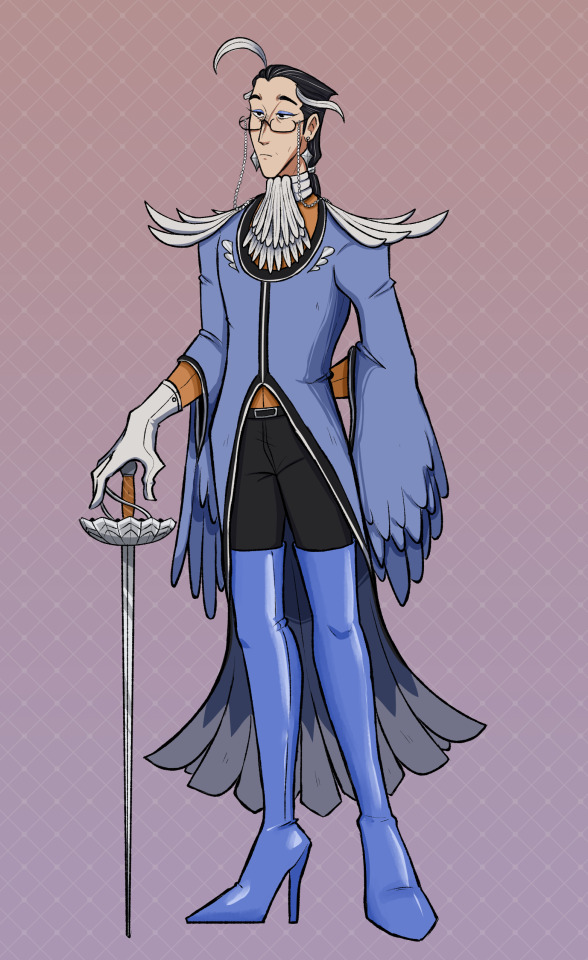
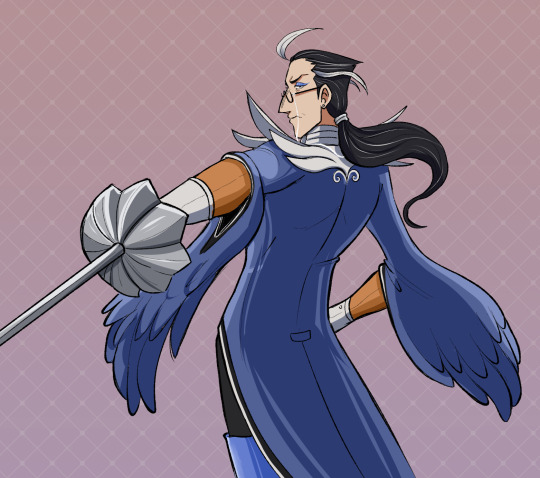
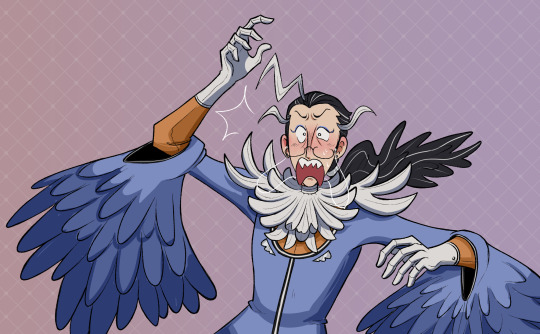
To go along with Augmen de Lute, this is Vanellus Plover! He's acting as Augmen's (very temporary he insists) second in command for the Arrowpoint Pirates.
A once important accountant, secretary, and scribe for Sir Crocodile, Plover finds himself without a home when the warlord is arrested. Since he was travelling with Augmen at the time, the hospitable captain offers him a place to stay, and while reluctant to stay on the loud party boat for much longer, he takes him up on that offer.
I've got more info and bonus sketches below under the cut and if you want you can check him out on art fight!
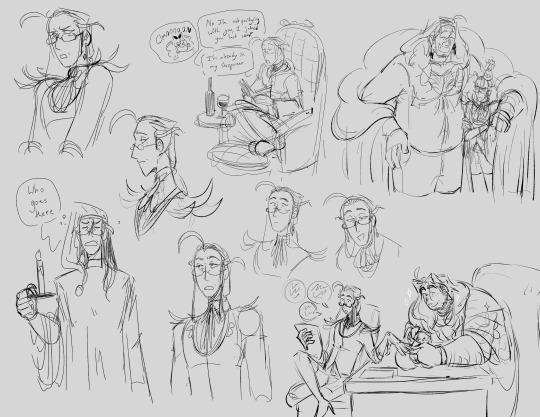
Height: 5 ft 11 in/180 cm Age:44 Pronouns: he/him Gay
Plover would not call himself a pirate, he doesn’t even really like being out at sea.
Nevertheless he finds himself as the acting second in command aboard Captain Augmen de Lute’s ship. Originally he was an important secretary, accountant, and spy for Sir Crocodile. After the warlord’s sudden arrest, Plover finds himself alone. His new task is to keep Crocodile’s confidential documents and accounting information safe from Marines and pirates alike who want those invaluable files, as well as trying to keep his various business deals accounted for and afloat.
Plover was traveling with Augmen at the time of Crocodile’s arrest. Augmen was escorting the secretary as a favor to the now former-warlord, and now Plover has nowhere to safely go. Augmen offers to let him stay aboard the ship, due to both his hospitality and his knowledge that if anything happened to Plover, he would draw Crocodile’s ire. Augmen also finds Plover to be an interesting traveling companion, something he is always in desperate search of, and enjoys teasing the uptight secretary.
Plover is confident, secretive, uptight, and always working. Even on Augmen’s ship, he’s often squirreled away in his cabin, typing away on his typewriter at whatever classified business he has and making calls on the Den Den Mushi. While accustomed to the refined high-society gatherings of the business world, he’s unprepared for Augmen’s more wild and hedonistic parties. Augmen tries to get him to relax and enjoy himself, though Plover is resistant, claiming to prefer work to enjoying such vices. He does, overtime, become more willing to have fun and indulge in his own interests. He loves expensive clothing, books, and bedding.
Fun Facts: -His name and design are a reference to the Egyptian Plover, a species of bird associated with stories of birds who clean crocodiles' teeth -Doesn't usually go by his first name, Augmen has also given him the nickname "Feathers", he dislikes it -He’d rather stay in for the night with a rare manuscript and an expensive bottle of wine than join in on Augmen’s fun, but he’ll let himself be dragged out on occasion. -He’s secretly a bit of a romantic at heart, he buys trashy romance novels at ports when no ones looking -He appears calm and collected, but he’s got a big temper, making him easy to rile up -He’s quite skilled in espionage, fencing, and book balancing -With no devil fruit powers, he protects himself with his elegant rapier and acrobatic abilities, he can handle himself well in a fight -He’s met Augmen a few times before joining his crew, but never stayed aboard long. He always thought of the man as reckless, lazy, and unserious as a captain. But through his time with Augmen he’s witnessed how dedicated and hardworking he his for his crew, underneath the care-free demeanor. He’s often exasperated with the captain but has gained a lot of respect for him.
10 notes
·
View notes
Text

Northern Lapwing (Vanellus vanellus), family Charadriidae, order Charadriiformes, WB, India
photograph by Ashoke Shil
#lapwing#plover#shorebird#vanellus#charadriidae#charadriiformes#bird#ornithology#animals#nature#india
948 notes
·
View notes
Text
The teru-tero (Vanellus cayanus) is another bird which often disturbs the stillness of the night.
"Journal of Researches into the Natural History and Geology of the Countries Visited During the Voyage of H.M.S. Beagle Round the World, 1832-36" - Charles Darwin
#book quote#the voyage of the beagle#charles darwin#nonfiction#teru tero#pied lapwing#pied plover#vanellus cayanus#bird#stillness of the night#disturbance
0 notes
Text

The northern lapwing (Vanellus vanellus), also known as the peewit or pewit, tuit or tewit, green plover, or (in Ireland and Great Britain) pyewipe or just lapwing, is a bird in the lapwing subfamily. It is common through temperate Eurosiberia.
417 notes
·
View notes
Text

A couple of very baby-looking plovers.
Piping plovers can be found along the Atlantic coast of North America and in the Great Lakes region, as well as the Caribbean during the winter, spending their time on sandy or rocky beaches. These plovers have an elaborate mating display: A male will excavate several “scrapes” (nests), toss stones, and complete a courtship flight. A female will then choose his best scrape and demonstrate her choice by camouflaging it with beach debris. Like many plovers, parents may feign a broken wing to distract predators from their young. Chicks’ primary defense is their excellent camouflage. Unfortunately, piping plovers are endangered due to habitat destruction and nearby human activity, especially in relation to breeding sites.
Pied plovers, more accurately known as pied lapwings, live along lakes and rivers in northern South America. They are usually called plovers due to their plover-like appearance, but are taxonomically more closely related to lapwings, belonging to the genus Vanellus. They appear to be altitudinal migrants, pushed by the wet season to higher ground. They mainly eat insects and snails, and have even been recorded eating scorpions. They lay their eggs in shallow scrapes and camouflage them by covering them with sand.
15 notes
·
View notes
Text
BRACKET D
White-Throated Rail (Dryolimnas cuvieri)
They went extinct after their island sank but somehow evolved themselves back into existence after it came back up! What the fuck.
VERSUS
Spur-Winged Plover (Vanellus miles)
Taken directly from a nomination, “They are ugly and mean!”
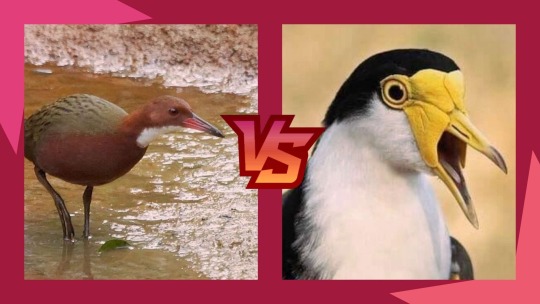
19 notes
·
View notes
Text
Northern Lapwing (Vanellus vanellus)

"named my blog after them. love their rounded wings." "the prettiest plover i have ever seen look at the gold tipped feathers (only juveniles have these) and the iridescent wings!! so cool!!!" "Childhood memories and the funky hairdo"
Also known as: peewit or pewit, tuit or tewit, green plover, or pyewipe (Ireland/Britain). The above pic is of a juvenile.
Apparently these guys don't back down from a fight, with their wikipedia article showing one parent mobbing a marsh-harrier, and their intro description saying they'll even attack horses and cattle that come to close to the nest.
There used to be a competition in the Netherlands to find the first peewit egg of the year, to which the eggs were then collected either as food or trophy. While the practice has been allowed to continue, it is only allowed during 1 March through 9 April, and collection of the eggs is forbidden.
Source:
Image Source: eBird (Yann Kolbeinsson)
#in memoriam (joke)#Northern Lapwing#Vanellus vanellus#charadriidae#european birds#asian birds#eurasian birds
11 notes
·
View notes
Text
Northern Lapwing

Or in Bigwordese Vanellus vanellus (Ah, I love species names that just repeat the generic name) AKA peewit or pewit, tuit or tewit, or even pyewipe,(all onomatopoeic of the birds song(s)) or green plover.
Their name 'lapwing' comes from the lapping sound their large wings make in flight, they are also known to make strange tottering motions in flight, but are capable of flying more regularly.
V. vanellus songs (catchy)
V. vanellus tottering example (majestic)
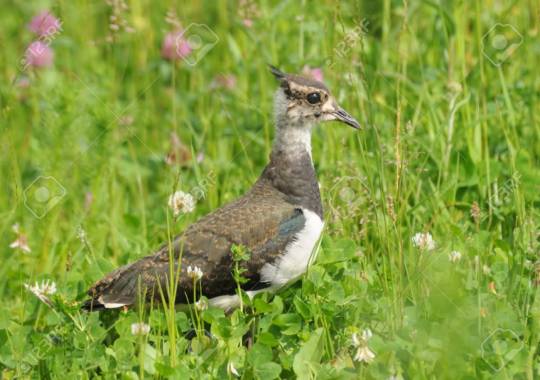
(A juvenile Northern Lapwing)
These shorebirds (or waders, for you Europeans) live/travel across much of the palearctic and oriental biogeographical regions, from Russia to North Africa and China, they mate in solitary pairs, the mother taking the head in incubating, and the father in protecting, though, these roles may be swapped out from individual pair to pair.
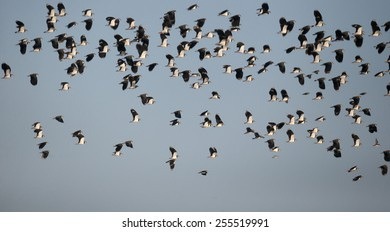
They are precocial, meaning that they're capable of moving and eating (mostly Earth worms and leatherjackets) on their own from the moment they hatch, parents and even unrelated Northern lapwings will participate in mobbing (where a prey species essentially gangs up on and bullies one of their predators) and deception to protect endangered chicks.
Adults eat grains, small fish, and invertebrates.

Rated near threatened by the IUCN their population has been on decline for several reasons including, but not limited to, newly introduced predators, hunting by humans, egg stealing by humans, new agricultural methods as they make good use of arable and otherwise agricultural land, and wetland drainage, which they also made use of.
Various actions are being taken by the EU and other groups to keep their situation from getting worse, lets hope it works out for these lovely feathered fellows.
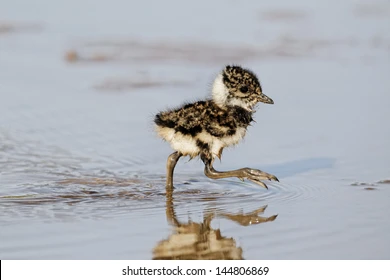
LOOK AT THE LIL CHICK!!!!
#northern lapwing#lapwing#Vanellus#Vanellus vanellus#birds#bird photography#cute animals#animal facts#animals#wild animal#cute birds#birdsong#Their crests are pretty cool too#Bird crest#Please inform me of any typos or erroneous information#SpeciesRunDown
2 notes
·
View notes
Photo


Kronenkiebitz | Crowned lapwing or crowned plover
Vanellus coronatus
2 notes
·
View notes
Photo

Masked lapwing (Vanellus miles)
Photo by Jason Moore
#predation#masked lapwing#masked plover#spur winged plover#vanellus miles#vanellus#vanellinae#charadriidae#charadriiformes#aequorlitornithes#neoaves#neognathae#aves#therapoda#archosauria#sauropsida#reptilia#tetrapoda#vertebrata#chordata
32 notes
·
View notes
Photo

June 23, 2020 - Crowned Lapwing or Crowned Plover (Vanellus coronatus)
Found in open areas, including recently burned and other short grasslands, these plovers live in eastern and southern Africa. They forage in small flocks for termites, ants, and other invertebrates. They nest on the ground, lining shallow depressions with plant materials and other debris. Both parents incubate the eggs and care for the chicks, which can leave the nest shortly after they hatch.
#crowned lapwing#crowned plover#lapwing#vanellus coronatus#bird#birds#illustration#art#grassland#birblr art
54 notes
·
View notes
Text

Northern Lapwing (Vanellus vanellus), family Charadriidae, order Charadriiformes, Kuwait
photograph by Shajahan Valiyakath
#lapwing#plover#vanellus#shorebird#charadriiformes#charadriidae#bird#ornithology#animals#nature#middle east
877 notes
·
View notes
Photo
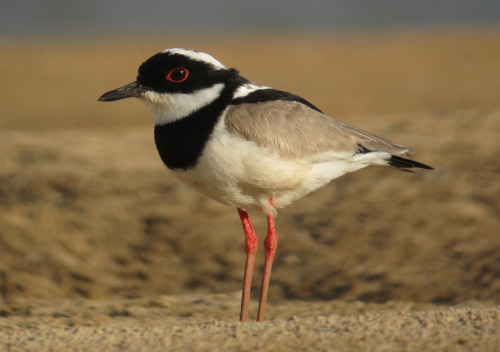
Pied Plover Mellisuga helenae Source: Here
#vanellus cayanus#vanellus#plover#pied plover#shorebird#wader#aves#bird#ornithology#charadriiformes#charadriidae#animal#animalia#wildlife#nature
114 notes
·
View notes
Photo
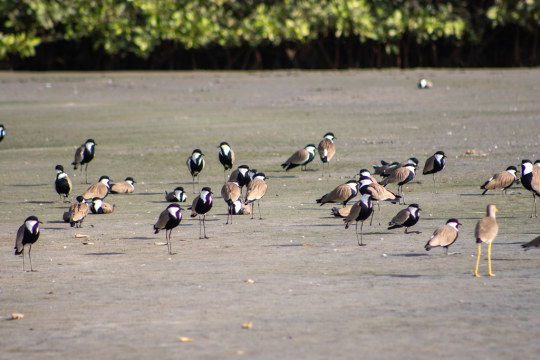
Spur-winged Plover (Vanellus spinosus) by Dis da fi we The spur-winged lapwing or spur-winged plover (Vanellus spinosus) is a lapwing species, one of a group of largish waders in the family Charadriidae. It is one of several species of wader supposed to be the "trochilus" bird said by Herodotus to have been involved in an unattested cleaning symbiosis with the Nile crocodile. see more of my images for sale! Here! Upload your images! Here! www.shutterstock.com/g/Ian+Peter+Morton?rid=270836376&... www.istockphoto.com/portfolio/IanMorton stock.adobe.com/uk/contributor/210309934/Ian https://flic.kr/p/2ncbsSL
0 notes
Text
The Pheasant vs The Lapwing
In the early 80s, I worked on the tropical island of Borneo for 18 months. It was on my first run on the moors after I returned that I realised just how quiet they were. In the jungle, there was a constant cacophony of sound, so much you tended to become obvious to it. Here you may get the occasional grouse who does not seem able to fly without its machine gun call, and in the spring there are…
View On WordPress
3 notes
·
View notes
Photo

Lapwing and Grey Plover - Abibe-comum e Tarambola-cinzenta (Vanellus vanellus and Pluvialis squatarola)
Vila Franca de Xira/Portugal (3/12/2021)
[NIkon D500; AF-S Nikkor 500mm F5,6E PF ED VR with Nikon AF-S TC-14E III; 1/2000s; F8; 400 ISO]
7 notes
·
View notes